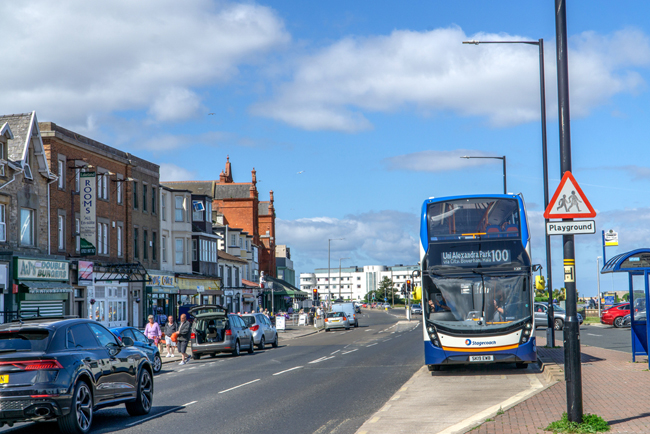A commuter group has called on ministers to ‘pause’ their flagship National Bus Strategy and urgently review the legislation behind it, describing the strategy as an accelerated programme of Enhanced Partnerships whose purpose is to revive the ‘failed policy’ of deregulation.
The Association of British Commuters (ABC) said that a Freedom of Information request it submitted to the Department for Transport (DfT) had revealed that the department had not conducted any cost-benefit analyses or demand forecasts comparing deregulation with Enhanced Partnerships, franchising and municipal ownership, other than what was in the impact assessment for what became the Bus Services Act 2017.

Going on a summer holiday? A Stagecoach bus in Morecambe in June 2021
The impact assessment shows that the DfT expected that developing a franchising option would create greater economic benefits than develop an enhanced partnership option and that the benefits of franchising would be nearly as great as developing both options.
In April, transport minister Rachel Maclean said in response to a written parliamentary question that under franchising, the DfT had estimated that there will be a ‘significant increase’ in patronage and that under Enhanced Partnerships, it had estimated that patronage ‘will increase’.
The ABC said that it believed that public control of buses was never intended to be a realistic option for local authorities under the strategy, which was published earlier this year or the Bus Services Act, and that every local transport authority (LTA ) in England has now been ‘coerced’ by the threat of losing access to all future bus funding into starting on a path to Enhanced Partnerships.
As Transport Network has reported, LTAs were required to state by the end of June whether they plan to introduce Enhanced Partnership or a bus franchising assessment and by the end of March 2022 must have either an Enhanced Partnership scheme in place or be following the statutory processes to develop a bus franchising assessment, if they are to receive government funding under the strategy.
However, only LTAs that are also mayoral combined authorities have the automatic right to introduce franchising, with the Act setting out a lengthy and torturous route for other authorities. In addition, the DfT admitted that its guidance on the issue of franchising was out of date and possibly incompatible with the strategy.
The ABC said it has still not been updated, despite a pledge in April from transport minister Baroness Vere, and that the franchising process would be sped up.
The group pointed out that the Government has committed to supporting access to franchising powers ‘for local authorities with the capacity and intention to use them’, stating: ‘It’s now a priority to call them in on that promise.’
It also criticised the requirement under the second stage of the strategy for LTAs to complete a ‘Bus Service Improvement Plan’ (BSIP) by 31 October to remain eligible for funding.
The group said that LTA’s are being encouraged to put resources into short-term issues, rather than long term goals and that invitations for ‘reciprocal investment’ under BSIPs are to be ‘heavily weighted’ towards what local authorities can provide, with only minor improvements expected from bus operators.
The ABC said there is an ‘urgent need for Parliamentary intervention’ before the BSIP deadline and warned that if the Enhanced Partnership programme goes forward next April, ‘councils will be locked into bus deregulation for the long-term’.
So far only Greater Manchester Combined Authority under metro mayor Andy Burnham has begun the process of introducing franchising. This was subsequently the subject of an ongoing legal challenge from bus operators including Stagecoach, who have argued that the authority was wrong to drop discussions on a partnership model.
The ABC said that Greater Manchester’s 2019 case for franchising found that it offered almost three times the economic value of the bus companies’ partnership proposal.
Register now for full access
Register just once to get unrestricted, real-time coverage of the issues and challenges facing UK transport and highways engineers.
Full website content includes the latest news, exclusive commentary from leading industry figures and detailed topical analysis of the highways, transportation, environment and place-shaping sectors.
Use the link below to register your details for full, free access.
Already a registered? Login